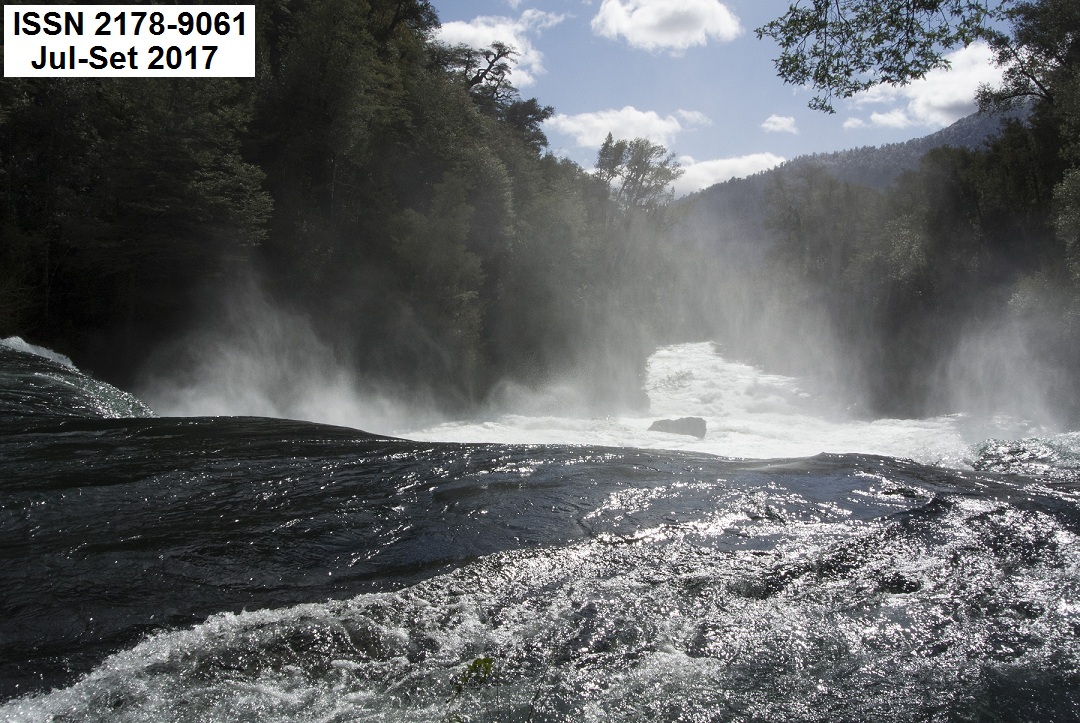Festivales Gastronómicos y Turismo en Latinoamérica. El Festival Raíces de Guayaquil, Ecuador / Gastronomic Festivals and Tourism in Latin America. Raíces Festival of Guayaquil, Ecuador
Keywords:
Turismo / Tourism. Festivales Gastronómicos / Food Festivals. Desarrollo Económico / Economic Development. Ecuador. Latinoamérica / Latin AmericaAbstract
RESUMEN
El objetivo de este trabajo es contribuir a reforzar la literatura científica en el campo de los festivales gastronómicos en América Latina. Este artículo sintetiza los resultados de un trabajo de campo realizado en el festival gastronómico Raíces, celebrado en Guayaquil, Ecuador, en julio de 2015, con el objetivo de conocer el perfil del turista que lo visita, las características de su viaje, sus percepciones respecto a diferentes aspectos relacionados con este festival y la satisfacción del visitante. Se ha aplicado el análisis factorial como técnica de reducción de datos. Los resultados revelan una tipología de turista mayoritariamente nacional, aunque se detecta una importante presencia de turistas extranjeros, mayoritariamente jóvenes y con una buena formación académica. Se ha comprobado una importante relación entre el deseo de conocer la gastronomía, renta disponible y la categoría de establecimientos hoteleros donde se alojan. Además, existe una motivación gastronómica en muchos visitantes. Estas relaciones deben tenerse en cuenta para considerar los festivales gastronómicos como importantes productos de oferta y de promoción turística, también en las ciudades de Latinoamérica.
PALABRAS CLAVE
Turismo. Festivales Gastronómicos. Desarrollo económico. Ecuador. Latinoamérica
ABSTRACT
The objective of this work is to help strengthen scientific literature about food festivals in Latin America. This article summarizes the results of a field work carried out in the gastronomic festival called Raíces held in Guayaquil, Ecuador, in July 2015, with the aim of knowing the profile of tourists who visit it, the characteristics of their trip, their perceptions about different topics related to this festival and visitor satisfaction. A factorial analysis has been applied as a data reduction technique. The results show that the tourist is mostly national, but a significant presence of foreign tourists, mostly young people, with a good academic training. It has been found an important relationship between the desire of knowing the food, purchase power, and category of hotels where they stay. In addition, many visitors are motivated to know the gastronomy. These relationships should be taken into account to consider food festivals as an important tourist offer and tourist promotion, also in the cities of Latin America.
KEYWORDS
Tourism. Food Festivals. Economic Development. Ecuador. Latin America.
AUTORES
Guzmán Antonio Muñoz Fernández – Doctor. Profesor Departamento de Estadística, Econometría, Investigación Operativa, Universidad de Córdoba, Cordoba, Andalucía, Spain. http://orcid.org/0000-0003-4521-4793. E-mail: guzman.munoz@uco.es
Claudia Patricia Uribe Lotero – Master. Profesor na Universidad Casa Grande, Guayaquil, Ecuador. E-mail: curibe@casagrande.edu.ec
Jesús Claudio Pérez Gálvez – Doctor. Profesor Departamento de Estadística, Econometría, Investigación Operativa, Universidad de Córdoba, Cordoba, Andalucía, Spain.Currículo: https://www.researchgate.net/profile/Jesus_Perez_Galvez/publications. E-mail: dt1pegaj@uco.es
Ingrid Cristina Ríos Rivera – Doctora. Profesor na Universidad Casa Grande, Guayaquil, Ecuador. E-mail: irios@casagrande.edu.ec
BIBLIOGRAFÍA
Ascanio, A. (2009). Rutas gastronómicas chilenas: una aproximación al tema. Pasos: Revista de turismo y patrimonio cultural, 7(2), 1- 27.
Axelsen, M. & Swan, T. (2010). Designing festival experiences to influence visitor perceptions: The case of a wine and food festival. Journal of Travel Research, 49(4), 436-450.
Baker, D. A. & Crompton, J. L (2000). Quality, satisfaction and behavioral intentions. Annals of tourism research, 27(3), 785-804.
Banco Mundial (2015).
Bigné, J. E., Font, X. & Andreu, L. (2000). Marketing de destinos turísticos: análisis y estrategias de desarrollo. Madrid: ESIC Editorial.
Björk, P. & Kauppinen-Räisänen, H. (2014). Culinary-gastronomic tourism - a search for local food experiences. Nutrition & Food Science, 44 (4), 294-309.
Björk, P. & Kauppinen-Räisänen, H. (2016). Local food: a source for destination attraction. International Journal of Contemporary Hospitality Management, 28 (1), 177-194.
Bortnowska, K., Alberton, A. & Marinho, S. V. (2012). Cultura e alimentaçao: Análisis das Festas Gastronomicas na Serra Gaúcha. Rosa Dos Ventos, 4 (3), 369-383.
Brunori, G. & Rossi, A. (2000). Synergy and coherence through collective action: some insights from wine routes in Tuscany. Sociologia ruralis, 40(4), 409-423.
Çela, A., Knowles-Lankford, J. & Lankford, S. (2007). Local food festivals in Northeast Iowa communities: A visitor and economic impact study. Managing Leisure, 12(2-3), 171-186.
Ceretta, C.C. (2012). Eventos de marca: evidências de valor turístico na gastronomia regional do Rio Grande do Sul-Brasil. Revista Rosa dos Ventos, 4(1), 89-99.
Chaney, S., & Ryan, C. (2012). Analyzing the evolution of Singapore's World Gourmet Summit: An example of gastronomic tourism. International journal of hospitality management, 31(2), 309-318.
Chang, W. & Yuan, J. J. (2011). A taste of tourism: Visitors' motivations to attend a food festival. Event management, 15(1), 13-23.
Chen, C. & Chen, F. (2010). Experience quality, perceived value, satisfaction and behavioral intentions for heritage tourists. Tourism management, 31(1), 29-35.
Chi, C. & Qu, H. (2008). Examining the structural relationships of destination image, tourist satisfaction and destination loyalty: An integrated approach. Tourism Management, 29(4), 624-636.
Crompton, J. L. (1979). Motivations for pleasure vacation. Annals of Tourism Research, 6(4), 408-424.
Dos Santos, R. I. C. & Antonini, B. O. (2004). La gastronomía típica de la isla de Santa Catarina-Brasil. Estudios y Perspectivas en Turismo, 13, 89-110.
Finn, M., Walton M. & Elliott-White, M. (2000). Tourism and leisure research methods: Data collection, analysis, and interpretation. Pearson Education.
Fox, R. (2007). Reinventing the gastronomic identity of Croatian tourist destinations, International Journal of Hospitality Management. 26(3), 546-559.
Gagić, S., Tešanović, V., Ivkov-Džigurski, A., Pivac, T. & Jovičić, A., (2013). Motives and attitudes of food and drink festival visitors: A case study of Serbia. Journal of Food, Agriculture & Environment, 11(1), 1055-1059.
Getz, D. & Brown, G. (2006). Critical success factors for wine tourism regions: a demand analysis. Tourism Management, 27(1), 146-158.
Henderson, J. C. (2009). Food tourism reviewed. British Food Journal, 111(4), 317-326.
Hidalgo Alcázar, M. C. (2014). Estudio de las dimensiones cognitiva y afectiva de la imagen de un destino turístico. Un enfoque a través de la teoría de las representaciones sociales = Cognitive and affective dimensions of tourism destination image. An approach through the theory of social representation. Proyecto de investigación.
Hollows, J., Jones, S., Taylor, B. & Dowthwaite, K. (2014). Making sense of urban food festivals: cultural regeneration, disorder and hospitable cities. Journal of Policy Research in Tourism, Leisure and Events, 6(1), 1-14.
Horng, J. S., Liu, C. H., Chou, H. Y. & Tsai, C. Y. (2012). Understanding the impact of culinary brand equity and destination familiarity on travel intentions. Tourism Management, 33(4), 815-824.
Horng, J. S., Su, C. S. & So, S. I. A. (2013). Segmenting food festival visitors: applying the theory of planned behavior and lifestyle. Journal of Convention & Event Tourism, 14 (3), 193-216.
Ignatov, E. & Smith, S. (2006). Segmenting Canadian culinary tourists. Current Issues in Tourism, 9(3), 235-255.
Kim, Y., Duncan, J. & Chung, B. (2015). Involvement, satisfaction, perceived value, and revisit intention: a case study of a food festival. Journal of Culinary Science & Technology, 13(2), 133-158.
Kim, Y., Kim, M. & Goh, B. K. (2011). An examination of food tourist’s behavior: Using the modified theory of reasoned action. Tourism Management, 32(5), 1159-1165.
Lee, C. K., Lee, Y. K. & Wicks, B. E. (2004). Segmentation of festival motivation by nationality and satisfaction. Tourism management, 25(1), 61-70.
Lee, I. & Arcodia, C. (2011). The role of regional food festivals for destination branding. International Journal of Tourism Research, 13 (4), 355-367.
López-Guzmán, T. & Sánchez-Cañizares, S. (2012). Culinary tourism in Córdoba (Spain). British Food Journal, 114(2), 168-179.
Matta, R. (2001). Posibilidades y límites del desarrollo en el patrimonio inmaterial. El caso de la cocina peruana. Apuntes: Revista de Estudios sobre Patrimonio Cultural - Journal of Cultural Heritage Studies, 24(2), 196-207.
Mejía, M.O., Franco, W.C, Franco, M.C. & Flores, F.Z. Perfil y Preferencias de los Visitantes en Destinos Con Potencial Gastronómico: Caso ‘Las Huecas’ de Guayaquil. Rosa dos Ventos – Turismo e Hospitalidade 9(2), 200-215.
Memelsdorff, F. (1998). Marketing estratégico en turismo: branding, identidad y cultura corporativa. Revista Valenciana d´Estudis Autonómics, 25, 73-80.
Mitchell, R. & Hall, C. M. (2006). Wine tourism research: the state of play. Tourism Review International, 9(4), 307-332.
Muñoz-Fernández G. A., Pérez, J. & López-Guzmán, T. (2016). Las sinergias entre el vino, los viajes y los festivales enogastronómicos. Un análisis de motivación y satisfacción. International Journal of Scientific Management Tourism, 2(3), 225-240.
Nicolau. J. L & Mas, F. J. (2006). The influence of distance and prices on the choice of tourist destinations: The moderating role of motivations. Tourism Management, 27 (5), 982-996.
Ottembacher, M. C. & Harrington, R. (2013). A case study of a culinary tourism campaign in Germany: implications for strategy making and successful implementation. Journal of Hospitality and Tourism Research, 37 (1), 3-28.
Pérez-Gálvez, J. C., Muñoz-Fernández, G. A. & Lopez-Guzman, T. (2015). Wine festivals as a vehicle of promotion of a tourist destination. Mediterranean Journal of Social Sciences, 6(3 S2), 574-581.
Riley, M. (2005). Food and beverage management: A review of change. International Journal of Contemporary Hospitality Management, 17(1), 88-93.
Schlüter, R. & Ellul, D. T. (2008). Gastronomía y turismo en Argentina. Polo gastronómico Tomás Jofré. Pasos Revista de turismo y patrimonio cultural, 16(2), 249-68.
Schlüter, R. (2006). Turismo y patrimonio gastronómico: una perspectiva. Buenos Aires: Centro de Investigaciones y Estudios Turísticos.
Smith, S. & Costello, C. (2009). Segmenting visitors to a culinary event: Motivations, travel behavior, and expenditures. Journal of Hospitality Marketing & Management, 18(1), 44-67.
Szivas, E. (1999). The development of wine tourism in Hungary, International Journal of Wine Marketing. 11(2), 7-17.
Tikkanen, I. (2007). Maslow's hierarchy and food tourism in Finland: five cases. British Food Journal, 109(9), 721-734.
Tse, P. & Crotts, J. C. (2005). Antecedents of novelty seeking: international visitors’ propensity to experiment across Hong Kong’s culinary traditions. Tourism Management, 26 (6), 965-968.
Valduga, V. (2014). El enoturismo en Brasil: Un análisis territorial en el Estado de Rio Grande do Sul (Brasil) desde 1870 hasta 1970. Estudios y Perspectivas en Turismo, 23(2), 278-304.
Wan, Y. K. P. & Chan, S. H. J. (2013). Factors that affect the levels of tourists' satisfaction and loyalty towards food festivals: a case study of Macau. International Journal of Tourism Research, 15(3), 226-240.
Wu, H. C., Wong, J. W. C. & Cheng, C. C. (2014). An empirical study of behavioral intentions in the food festival: The case of Macau. Asia Pacific Journal of Tourism Research, 19(11), 1278-1305.
Yoon, Y. & Uysal, M. (2005). An examination of the effects of motivation and satisfaction on destination loyalty: a structural model. Tourism Management, 26(1), 45-56.
Yoon, Y. S., Lee, J. S. & Lee, C. K. (2010). Measuring festival quality and value affecting visitors’ satisfaction and loyalty using a structural approach. International Journal of Hospitality Management, 29(2), 335-342.
Yuan, J. J. & Jang, S. S. (2007). The effects of quality and satisfaction on awareness and behavioral intentions: Exploring the role of a wine festival. Journal of Travel Research, 46(3), 279-288.
Yuksel, A., Yuksel, F. & Bilim, Y. (2009). Destination attachment: Effects on customer satisfaction and cognitive, affective and conative loyalty. Tourism Management, 31(2), 274-284.
Recebido: 14 DEZ 2016
Avaliado: FEV-MAR 2017
Revisado: ABR 2017
Aceito: 14 ABR 2017
Downloads
Published
How to Cite
Issue
Section
License
Autores que publicam nesta revista concordam com os seguintes termos:
Os Autores mantém os direitos autorais e concedem à revista o direito de primeira publicação, com o trabalho simultaneamente licenciado sob a Creative Commons Attribution License que permitindo o compartilhamento do trabalho com reconhecimento da autoria do trabalho e publicação inicial nesta revista.
Autores têm autorização para assumir contratos adicionais separadamente, para distribuição não-exclusiva da versão do trabalho publicada nesta revista (ex.: publicar em repositório institucional ou como capítulo de livro), com reconhecimento de autoria e publicação inicial nesta revista.
Autores têm permissão e são estimulados a publicar e distribuir seu trabalho online (ex.: em repositórios institucionais ou na sua página pessoal) a qualquer ponto antes ou durante o processo editorial, já que isso pode gerar alterações produtivas, bem como aumentar o impacto e a citação do trabalho publicado (Veja O Efeito do Acesso Livre).








